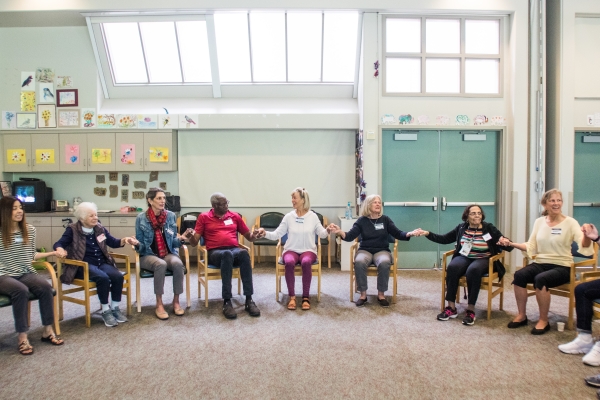
By Chris Kenrick
B Special to The Almanac
When Barbara Kalt invited a team of French researchers to bring an experimental therapeutic tango program to Menlo Park’s Rosener House earlier this year, she wasn’t sure whether the dance steps would help improve the cognition, gait and balance in participants with Alzheimer’s disease. She hoped, at the very least, that it might make the lives of those who use the adult day care facility more fun and interesting. Either way, the program would be a win-win, figured Kalt, the director of Rosener House at the time.
“Everybody hears about all the failures of the new drugs for people with Alzheimer’s, but we’re just kind of moving forward with non-drug interventions and trying to improve the lives of people living with Alzheimer’s and dementia,” said Kalt.
In April, the team of French researchers brought its therapeutic tango program, Caravan of Memory, to Rosener House as part of a study on motor function in people with Alzheimer’s disease. The Menlo Park facility is the first venue in the nation, and among only seven outside of France, to participate in the dance study.
Launched in France 10 years ago, the tango program has been used in institutions in at least eight French cities, where it’s being measured by France Mourey, a researcher at the University of Burgundy. Tango uses movements of everyday life — balance, weight transfer, support and posture — and is thought to have more therapeutic advantages than other dance forms, according to the study’s researchers.
At Rosener House, about 20 seniors — assisted by volunteers — are taking part in the program every Wednesday from now to September. At the end of six months, researchers will test whether there are improvements in their memory and balance. French filmmakers Anne Bramard Blagny and Julia Blagny also are documenting the dance sessions for a documentary aimed at encouraging other facilities to replicate the project.
“The purpose of it is to see how their cognitive function improves but also how their gait and balance and spatial awareness can improve after weeks of doing this,” said Shanah Hawk, Rosener House program coordinator. “And it’s definitely a mood boost.”
In the first few weeks of tango, activity leader Josh Cano said he’s already observed changes in people with mood, speech and focus.
On a recent Wednesday, volunteer dance partners, instructors and musicians poured into Rosener House to get the dance party started.
Accordion player Roger Strom of Los Altos, who said he feels indebted to Rosener House for helping his wife after she was diagnosed with early-onset of Alzheimer’s a decade ago at age 54, struck up some music as Cano asked participants to warm up by moving their upper bodies, clapping and stomping their feet to the beat.
Over the next hour, participants performed a simple walking dance to the syncopated tango rhythm as Cano guided them through steps, turns, multiple changes of partners and a water break.
The session ended with a cool-down period led by Hawk, accompanied by relaxing piano music played by music therapist Kristopher Hong.
Hawk guided the participants to do “anything that helps you relax and calm down, even if it’s not moving, even if it’s just closing your eyes.”
After some swaying, stretching, deep breathing, foot circles, hand-holding and final farewells to dance partners, the room broke into chatter and applause.
“There’s an old saying about use it or lose it,” said participant Kent, a Menlo Park retiree who attends Rosener House five days a week and requested that he be identified by his first name only.
“This tango project is very subtly, but very definitely, aimed to get people active: standing up, moving, eye and hand coordination, the sense of rhythm,” Kent said. “You walk away tired and sore and you step on a lot of feet, but it’s all about getting the mind working, the heart working, the enjoyment, the pleasure.”
Rosener House, at 500 Arbor Road in Menlo Park, runs the five-day-a-week program with a daily headcount of 50 to 55 people living with Alzheimer’s disease, dementia, early memory loss, stroke, Parkinson’s disease and other chronic conditions. It is managed by Peninsula Volunteers, Inc., a 72-year-old local charitable organization, which specializes in programs serving older adults. For more information about the tango program, go to 1pvi.org.
Chris Kenrick is a freelance writer.
This post originally appeared on the Almanac to view it in its entirety click here


